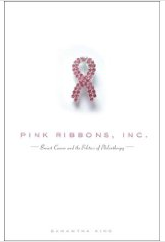 I have read the book, and hope to see this movie. The book is an excellent commentary on pink washing, whereby a company connects with the breast cancer bandwagon, but doesn't truly respect the notion that we must watch for chemicals that cause cancer.
I have read the book, and hope to see this movie. The book is an excellent commentary on pink washing, whereby a company connects with the breast cancer bandwagon, but doesn't truly respect the notion that we must watch for chemicals that cause cancer.Many make-up products contain chemicals we know nothing about. Some are tested on animals, but that is another story.
The Canadian Cancer Society (CCS) is upset with the film. CCS tells us that 65% of funds raised go towards breast cancer research. This is not the case for many businesses that use the pink ribbon to raise their profile and their SEO.
Breast cancer has become the poster child of cause-related marketing campaigns. Countless people walk, run and shop for the cure. Each year, millions of dollars are raised in the name of breast cancer, but where does this money go and what does it actually achieve?

Directed by Léa Pool and produced by Ravida Din, Pink Ribbons, Inc. is a feature documentary from the National Film Board of Canada that shows how the devastating reality of breast cancer, which marketing experts have labeled a “dream cause,” has become obfuscated by a shiny, pink story of success.
 Watch a clip from Pink Ribbons, Inc. (Clip)online at NFB.ca
Watch a clip from Pink Ribbons, Inc. (Clip)online at NFB.caPink Ribbons, Inc. opens theatrically across Canada, starting ...
www.onf-nfb.gc.ca › ... › Press Room › Press Releases & Media Kits
The National Film Board of Canada presents Pink Ribbons, Inc. Directed by Léa Pool. Produced by Ravida Din. Written by Patricia Kearns & Nancy Guerin...
"Highly revelatory—at times shocking—Pink Ribbons, Inc. challenges the commercialization of the breast cancer movement, its place in U.S. culture, and its influence on ideas of good citizenship, responsible consumption, and generosity. "
The author, Samantha King, is an associate professor of physical and health education and women’s studies at Queen’s University, in Kingston, Ontario. It is well-written, and an interesting read. It is, indeed, shocking, the amount of money sunk into 'research', with no promises of support or delivery of programs. If you donate, you must be sure to check out the background of the sponsors.
I would caution you in entering the 'race for the cure'. There are questions as to how much money goes to research, and how much should go to supporting those with cancer. The Canadian Cancer Society provides a range of services, for example: a lodge in which to stay, peer support, volunteer drivers, etc.). They are transparent in their financial statements.
Helping those with cancer – watch the video
Our information and support services help cancer patients and their caregivers by reducing anxiety and increasing hope. In this video healthcare professionals speak about the benefits of the services and former clients share how these services helped them through their cancer journey.
The Susan B. Komen foundation has raised more than a billion dollars. They charge big bucks to participate in their machine. The disease is being used for profit. Every marketing strategist in North America has at least thought about tying their product up in a pink ribbon.
Breast cancer has become the poster child of cause-related marketing campaigns - people walk, run and shop for 'the cure'. Each year, millions of dollars are raised in the name of breast cancer, but where does this money go and what does it actually achieve?
The recent Ottawa Run For The Cure raised $1.5 million dollars. How is it that this kind of money cannot find a cure? I believe we must put more money into prevention, treatment and services. We know how to reduce the risk of cancer, if not prevent it:
- eat a balanced diet (mostly plants), reduce fats and alcohol, exercise, get enough sleep, manage stress.
These sisters know that cancer is genetically heritable. How, then, could they have prevented it? Perhaps we need more genetic counselling. Perhaps those taking expensive, extreme in vitro fertilization should have the same counselling, rather than spending thousands of dollars to make a body get pregnant unnaturally.
Pink Ribbons, Inc. is a feature documentary that shows how the devastating reality of breast cancer, which marketing experts have labeled a "dream cause," has become obfuscated by a shiny, pink story of success.
For more information on this film, please visit Pink Ribbons, Inc. page or send an email to PinkRibbonsInc@nfb.ca.
12 Sep 2011
1 comment:
I must admit I'm a sucker for causes, Jenn, and ready to open my wallet far too often. My husband researches every cause he supports. He is thorough in his research and does the donating on behalf of both of us. I still manage to sneak some of my own money into places like Salvation Army Christmas kettles, and Girl Guide cookies, but mostly I respect his attempt to donate wisely.
K
Post a Comment